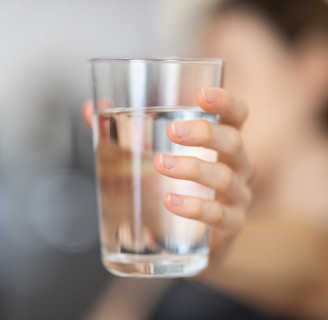The Benefits of Drinking Salty Water on an Empty Stomach
Discover the potential benefits of drinking salty water on an empty stomach. Learn how it may aid digestion, hydration, detox, and why safety precautions matter.
HEALTHBLOG-LIST
Narcisse Bosso
8/28/20252 min read


In Brief
Drinking a glass of warm salty water on an empty stomach, sometimes called a “salt water flush” is a practice rooted in natural cleansing traditions. Advocates claim it helps detoxify the body, stimulate digestion, and improve hydration. However, while there may be some benefits, overuse or improper preparation can lead to side effects. Here’s what you need to know.
Table of Contents
What Is a Salt Water Flush?
The Potential Benefits of Drinking Salty Water
Supports Digestion
Improves Hydration and Electrolyte Balance
May Aid Detoxification
Can Relieve Occasional Constipation
How to Prepare Salty Water Safely
Risks and Precautions
FAQ
Conclusion
What Is a Salt Water Flush?
A salt water flush usually involves mixing 1 teaspoon of unrefined sea salt or Himalayan salt into a glass of warm water and drinking it on an empty stomach. The combination of salt and water is believed to help cleanse the digestive tract and restore electrolyte balance.
👉 Also read: The Benefits of Proper Hydration.
The Potential Benefits of Drinking Salty Water
1. Supports Digestion
Salt water stimulates the production of digestive juices, which may help the stomach process food more efficiently.
2. Improves Hydration and Electrolyte Balance
Salt contains minerals like sodium, magnesium, and potassium that help the body retain fluids and maintain hydration.
3. May Aid Detoxification
Some natural health advocates suggest salty water helps flush toxins through the digestive system.
4. Can Relieve Occasional Constipation
Warm salty water may have a mild laxative effect, promoting bowel movements.
How to Prepare Salty Water Safely
Use 1 teaspoon of natural salt (Himalayan or sea salt).
Mix with 1 large glass (250–300 ml) of warm water.
Drink slowly, preferably in the morning on an empty stomach.
Limit use to once in a while, not daily, unless advised by a healthcare provider.
👉 See also: 10 worst food for your gut
Risks and Precautions
Too much salt can lead to dehydration, high blood pressure, or electrolyte imbalance.
Not recommended for people with hypertension, kidney disease, or heart problems.
Should not replace a healthy diet or medical treatments.
Always consult a doctor before trying a salt water flush regularly.
FAQ
1. Can I drink salty water every day?
Not recommended. Excess salt can harm your kidneys and blood pressure.
2. Does it really detoxify the body?
Evidence is limited. It may help bowel movements but doesn’t replace liver or kidney detox.
3. What type of salt should I use?
Unrefined sea salt or Himalayan salt is preferred, as it contains trace minerals.
4. How quickly does it work?
Some people notice bowel movements within 30–60 minutes, but results vary.
5. Is it safe for everyone?
No. People with chronic conditions should avoid it without medical advice.
Conclusion
Drinking salty water on an empty stomach can support digestion, hydration, and occasional detox, but it must be done safely and in moderation. While it may offer benefits, overuse carries risks. A healthy diet and lifestyle remain the foundation of good health.
💡 Action step: If you want to try this practice, start with a small glass of warm water and a pinch of natural salt and always listen to your body.
Scientific Sources
National Institutes of Health (NIH). Sodium and health.
Cleveland Clinic. Salt water flush: Safety and risks.
Mayo Clinic. Hydration and electrolyte balance.
Written by Narcisse Bosso, certified naturopath. His lifelong passion for health became a profound calling after a loved one passed away from a natural illness that could have been prevented with simple lifestyle changes and habits.
